
The Majestic Heart of Milan: Duomo District
Nestled in the vibrant center of Milan, the Duomo District is an iconic blend of historical grandeur and modern allure. Dominated by the breathtaking Milan Cathedral, known locally as the Duomo di Milano, this neighborhood is a must-visit for any traveler seeking to experience the essence of Italian culture and architecture. The Duomo, with its intricate Gothic spires and stunning facade, offers panoramic views of the city from its rooftop, an experience not to be missed. Beyond the cathedral, the Duomo District is a bustling hub of activity. The Galleria Vittorio Emanuele II, one of the world's oldest shopping malls, stands proudly nearby, providing a luxurious shopping experience amidst stunning 19th-century architecture. Here, visitors can indulge in high-end fashion, dine at exquisite restaurants, and enjoy a perfect espresso in charming cafes. Cultural enthusiasts will find the Duomo District rich with museums and historical sites, including the Museo del Novecento and the Palazzo Reale. Street performers, artists, and events frequently animate the area, creating a lively atmosphere that reflects the dynamic spirit of Milan. Whether you're exploring the narrow streets filled with hidden gems or soaking in the ambiance of the bustling piazza, the Duomo District promises a captivating and unforgettable experience.
Local tips in Duomo
- Visit the Duomo rooftop early in the morning to avoid crowds and enjoy the best views.
- Dress modestly when visiting the Duomo Cathedral as it is a place of worship.
- Explore the Galleria Vittorio Emanuele II at night to see its stunning lit-up architecture.
- Check for special exhibitions at the Museo del Novecento and Palazzo Reale before you go.
- Enjoy a coffee at one of the historic cafes inside the Galleria to soak in the local atmosphere.
The Majestic Heart of Milan: Duomo District
Nestled in the vibrant center of Milan, the Duomo District is an iconic blend of historical grandeur and modern allure. Dominated by the breathtaking Milan Cathedral, known locally as the Duomo di Milano, this neighborhood is a must-visit for any traveler seeking to experience the essence of Italian culture and architecture. The Duomo, with its intricate Gothic spires and stunning facade, offers panoramic views of the city from its rooftop, an experience not to be missed. Beyond the cathedral, the Duomo District is a bustling hub of activity. The Galleria Vittorio Emanuele II, one of the world's oldest shopping malls, stands proudly nearby, providing a luxurious shopping experience amidst stunning 19th-century architecture. Here, visitors can indulge in high-end fashion, dine at exquisite restaurants, and enjoy a perfect espresso in charming cafes. Cultural enthusiasts will find the Duomo District rich with museums and historical sites, including the Museo del Novecento and the Palazzo Reale. Street performers, artists, and events frequently animate the area, creating a lively atmosphere that reflects the dynamic spirit of Milan. Whether you're exploring the narrow streets filled with hidden gems or soaking in the ambiance of the bustling piazza, the Duomo District promises a captivating and unforgettable experience.
Iconic landmarks you can’t miss
Duomo di Milano
Discover the awe-inspiring Duomo di Milano, a Gothic cathedral that combines rich history with breathtaking architecture in the heart of Milan.
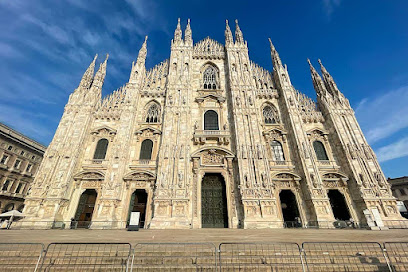
Palazzo Reale di Milano
Discover Milan's artistic heritage at Palazzo Reale di Milano, featuring stunning exhibitions in a historic setting near the iconic Duomo.
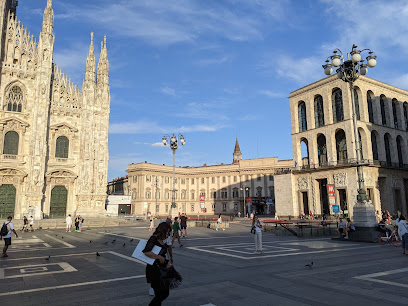
Cathedral Square
Discover Cathedral Square, the iconic heart of Milan, featuring the stunning Cathedral and vibrant culture, perfect for your Italian adventure.
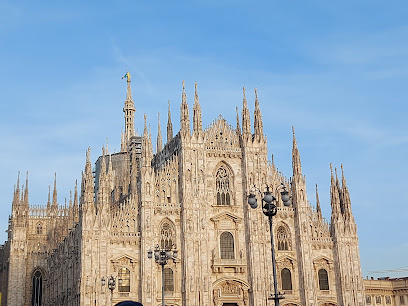
Piazza Mercanti
Discover the rich heritage of Milan at Piazza Mercanti, a historical landmark that showcases stunning architecture and vibrant local culture.
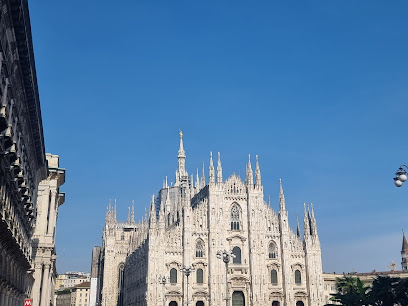
Santuario di San Bernardino alle Ossa
Discover the haunting beauty of Santuario di San Bernardino alle Ossa, a unique church in Milan featuring an intriguing ossuary and stunning Baroque architecture.
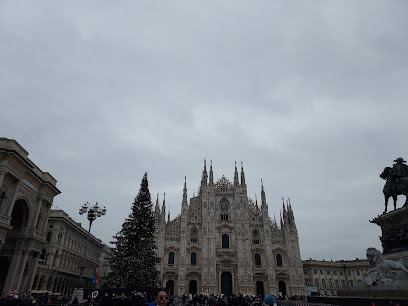
Museo del Duomo di Milano
Explore the captivating Museo del Duomo di Milano, where art and history come together to celebrate the iconic cathedral's legacy in the heart of Milan.
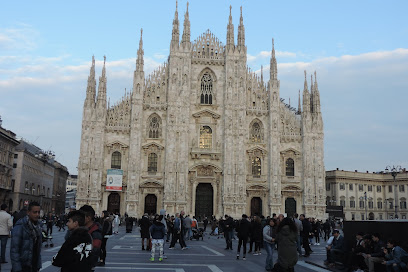
Statua di Vittorio Emanuele II
Explore the Statue of Vittorio Emanuele II in Milan, a historical landmark that embodies Italy's rich heritage and artistic excellence, located in the iconic Duomo Square.
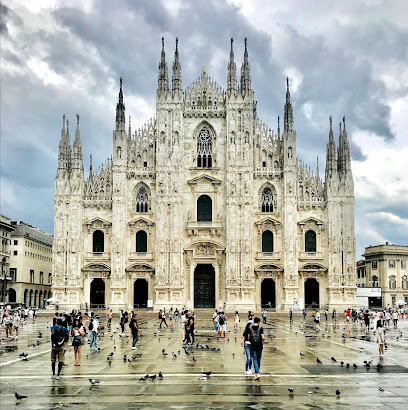
Terrazza del Duomo
Experience Milan from new heights at the Terrazza del Duomo, with stunning views of the city and its breathtaking architecture.
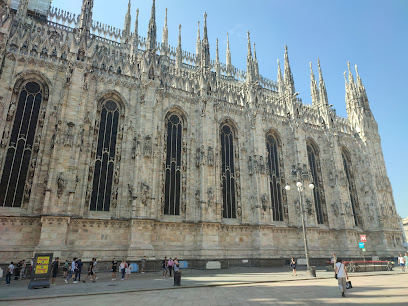
Madonnina
Explore the Madonnina, Milan's iconic symbol of faith and art, a must-see landmark that defines the skyline of this vibrant city.
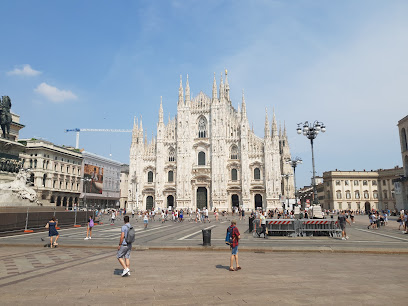
Arches of Ancient Porta Nuova
Discover the stunning Arches of Ancient Porta Nuova, a monumental gateway showcasing Milan's rich history and vibrant cultural landscape.
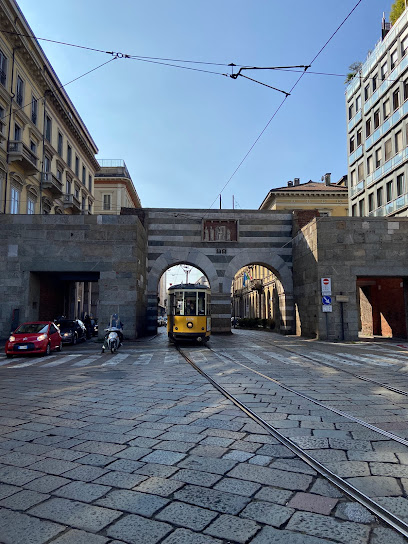
Unmissable attractions to see
Duomo di Milano
Explore Milan's iconic Gothic cathedral, a masterpiece of art and architecture with stunning rooftop views and centuries of history.
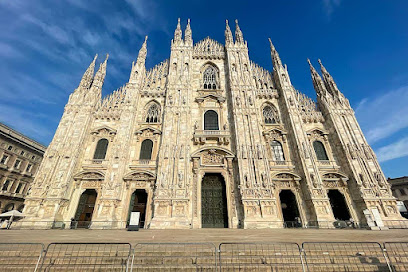
Museo del Duomo di Milano
Explore six centuries of art and history behind Milan's iconic Duomo, housed in the Royal Palace.
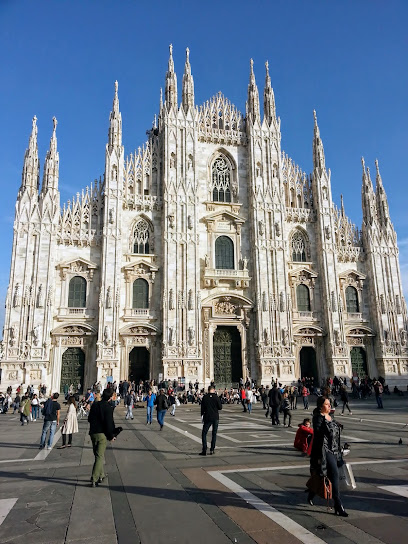
Statua di Vittorio Emanuele II
A historic monument in Milan's Piazza del Duomo, honoring the first king of a unified Italy.
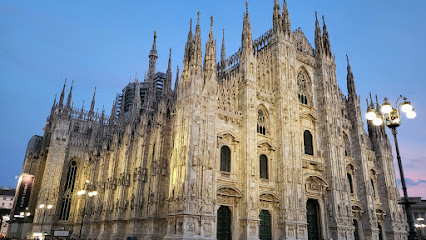
Terrazza del Duomo
Experience Milan from above: panoramic views, stunning architecture, and a unique perspective on the city's iconic Duomo.
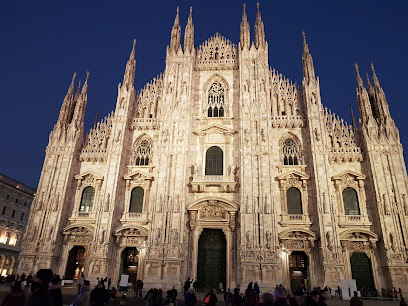
Madonnina
Milan's iconic golden statue of the Virgin Mary, perched atop the Duomo, symbolizing the city's faith, pride, and enduring spirit.
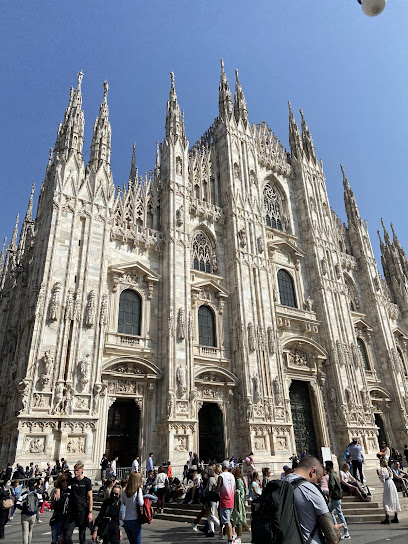
Walk of Fame Milano
Explore the vibrant Walk of Fame Milano, where Italian cinema and culture come alive in a picturesque setting perfect for tourists.
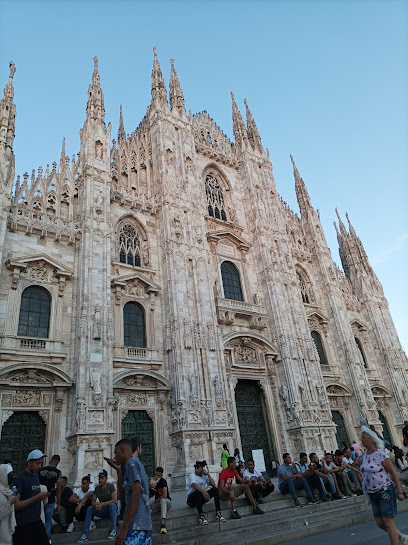
City Sightseeing Milan Bus Stop
Discover Milan's iconic landmarks and hidden gems with City Sightseeing's hop-on hop-off bus tours, offering a flexible and informative way to explore the city.
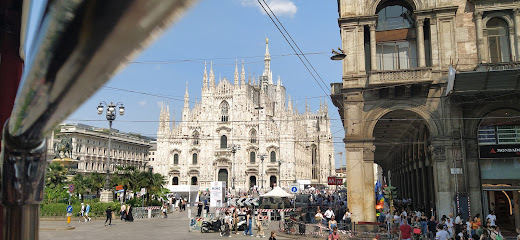
Essential places to dine
Ristorante Galleria
Experience authentic Italian cuisine at Ristorante Galleria amidst Milan's stunning historical architecture.
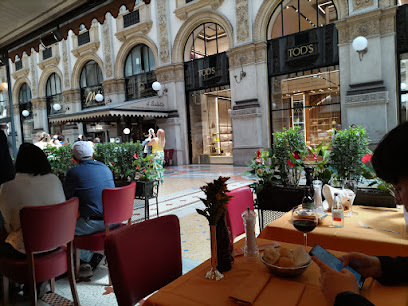
Obicà Mozzarella Bar - Duomo
Experience authentic Italian flavors at Obicà Mozzarella Bar - Duomo in Milan's iconic food hall.
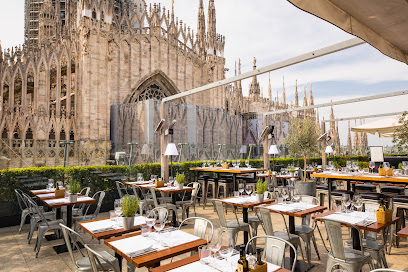
Slow Sud
Discover authentic Sicilian cuisine in Milan at Slow Sud, where every dish reflects the rich culinary heritage of Italy.
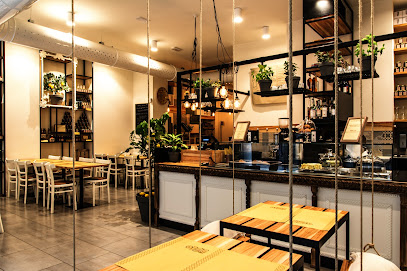
Risoelatte
Experience authentic Lombardian cuisine at Risoelatte in Milan – where tradition meets flavor in every dish.
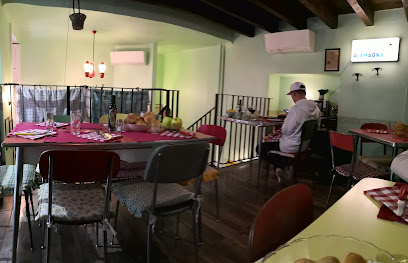
Maio Restaurant
Discover exquisite Italian cuisine at Maio Restaurant in Milan – where tradition meets modern elegance near the iconic Duomo.
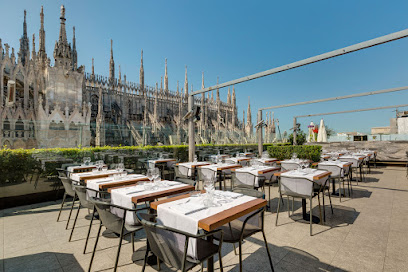
Giacomo Arengario
Experience exquisite Italian dining at Giacomo Arengario with breathtaking views of Milan's iconic Duomo.
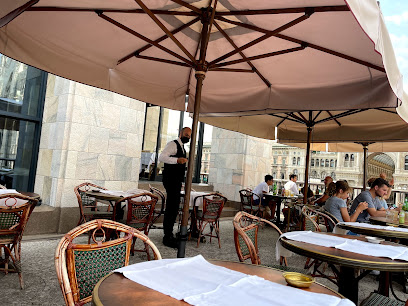
Valentino Legend
Experience authentic Italian cuisine at Valentino Legend, a culinary haven located in the heart of Milan, perfect for every discerning palate.
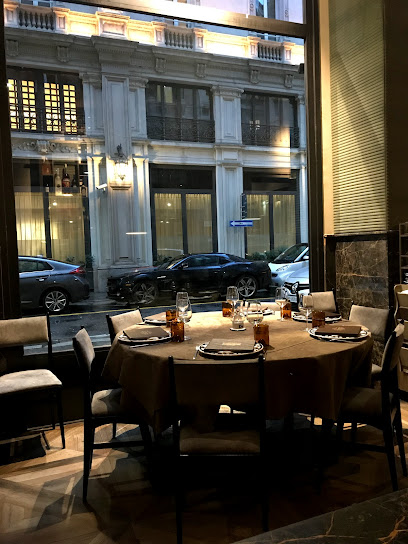
Casa Sorbillo Duomo
Discover authentic Italian flavors at Casa Sorbillo Duomo, where every pizza tells a story amidst Milan's vibrant culture.
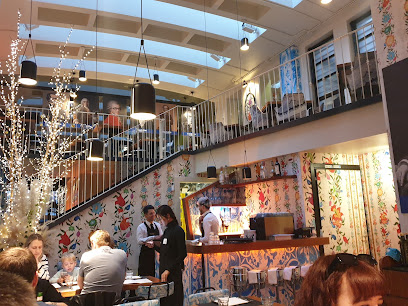
Ristorante Vista Duomo
Experience exquisite Italian cuisine at Ristorante Vista Duomo with stunning views of Milan's iconic cathedral.
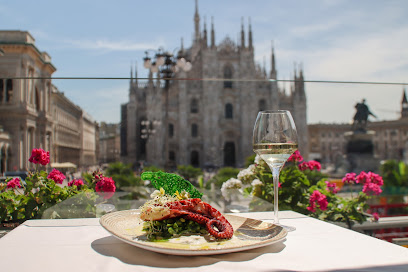
God Save the Food - Duomo
Experience authentic Italian cuisine at God Save the Food - Duomo in Milan, where tradition meets modern culinary artistry.
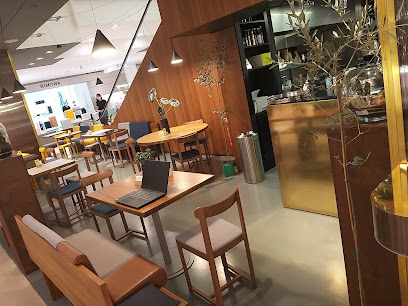
Markets, malls and hidden boutiques
Rinascente Milano
Discover the luxury shopping experience and breathtaking views at Rinascente Milano, the ultimate destination for fashion and indulgence in Milan.
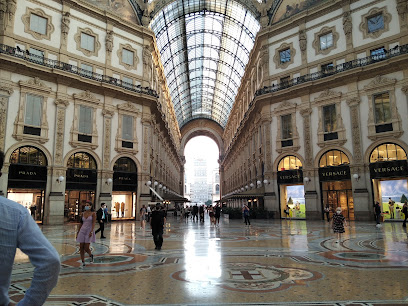
LOUIS VUITTON La Rinascente Milan Duomo Store
Experience the epitome of luxury shopping at LOUIS VUITTON La Rinascente Milan Duomo Store, nestled in Milan’s iconic Duomo square with exquisite offerings.
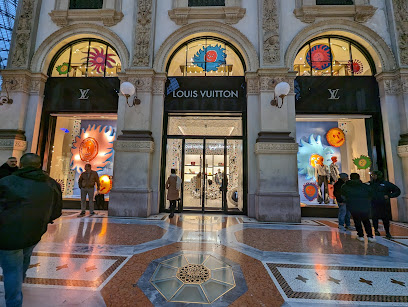
Milano Souvenir - in Piazza Duomo dal 1982
Explore Milano Souvenir in Piazza Duomo, your ultimate destination for authentic Milanese gifts and unforgettable memories.
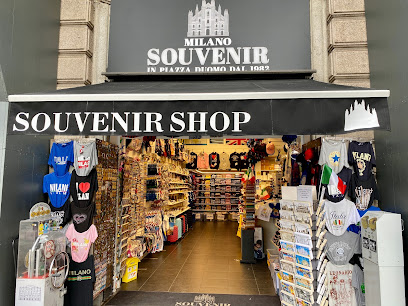
DIOR Milan Rinascente Duomo Store
Experience the epitome of luxury shopping at the DIOR Milan Rinascente Duomo Store, a fashion haven in the heart of Milan.
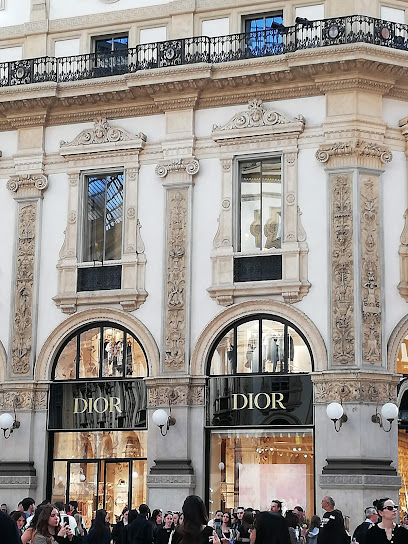
BALENCIAGA
Explore luxury footwear and fashion accessories at BALENCIAGA in the iconic Piazza Duomo, Milan's hub of elegance and style.
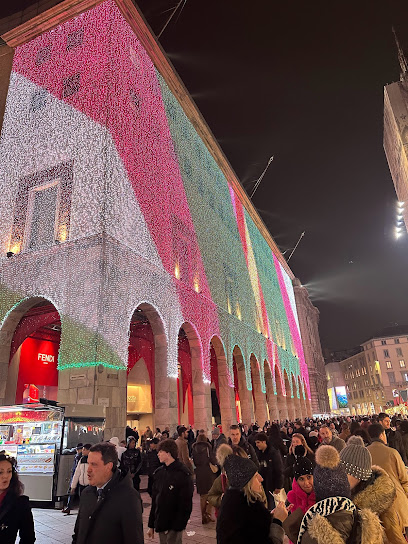
Duomo Shop
Discover Milan's rich culture at Duomo Shop, your go-to souvenir store for unique gifts and keepsakes in the heart of the city.
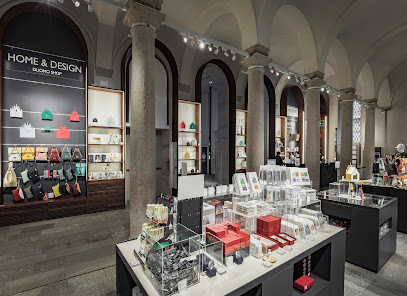
GIVENCHY Rinascente Milano Duomo
Experience the epitome of luxury shopping at GIVENCHY Rinascente Milano Duomo, featuring stunning fashion collections and iconic Milanese landscapes.
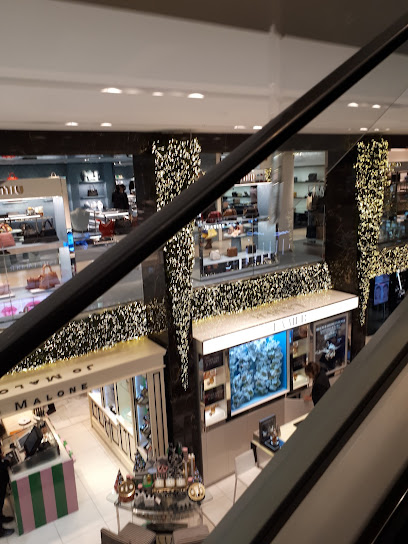
Pinko Boutique Duomo
Shop in style at Pinko Boutique Duomo, where Italian fashion meets contemporary elegance in the heart of Milan.
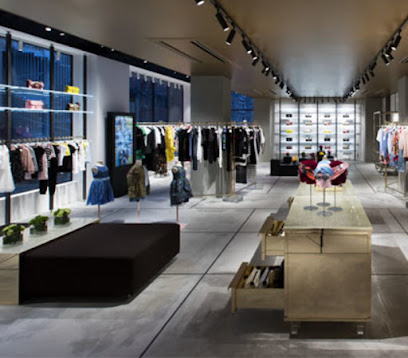
Off-White Milan La Rinascente
Discover Off-White Milan La Rinascente, where luxury streetwear meets Milan's fashion-forward culture in an unforgettable shopping experience.
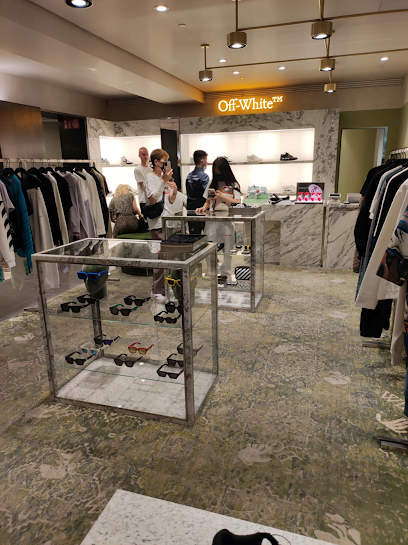
boutique duomo
Discover unique Italian fashion at Boutique Duomo, a stylish clothing store nestled in the heart of Milan's vibrant shopping district.
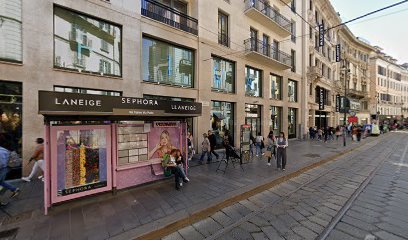
Essential bars & hidden hideouts
Terrazza Aperol
Discover Terrazza Aperol, a stylish bar in Milan's Galleria Vittorio Emanuele II, where exquisite cocktails meet breathtaking views.
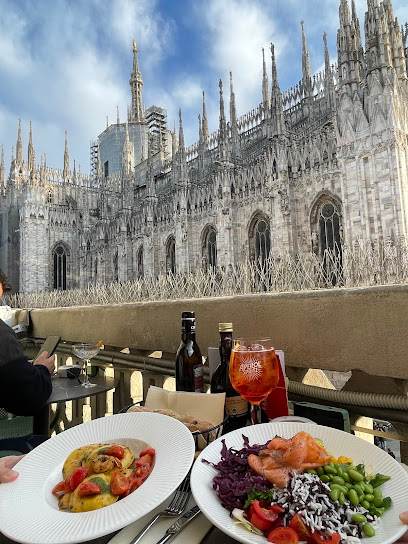
Obicà Mozzarella Bar - Duomo
Experience authentic Italian cuisine at Obicà Mozzarella Bar in Milan's iconic Piazza Duomo, featuring fresh mozzarella and delicious pizzas.
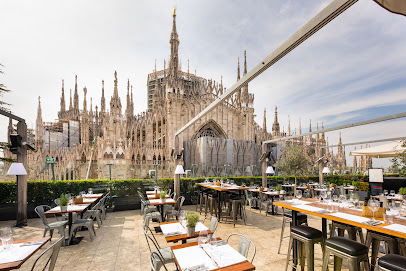
Camparino in Galleria
Experience the elegance of Milan at Camparino in Galleria, a historic cocktail bar with stunning views and exquisite Italian cuisine.
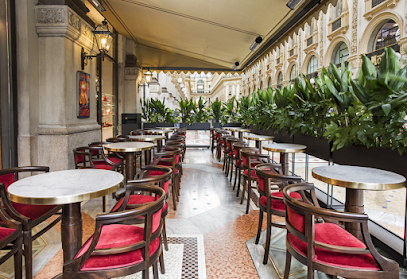
Terrazza Duomo 21
Discover breathtaking views of Milan from Terrazza Duomo 21, a premier cocktail bar and observation deck overlooking the iconic Cathedral.
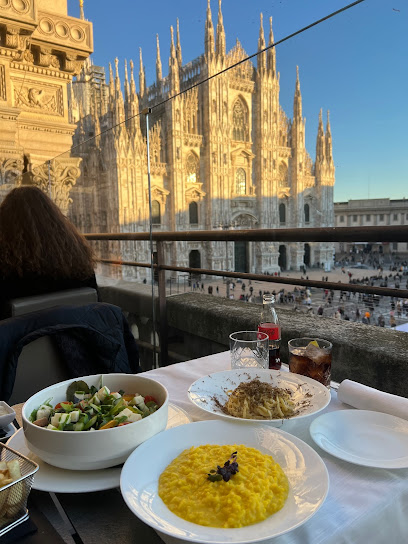
Bar Brera
Discover Bar Brera, a vibrant bar in Milan's Brera district, offering authentic Italian cuisine and a lively atmosphere for every occasion.
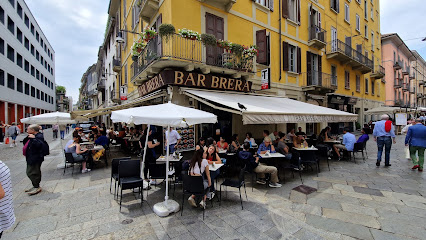
La Rinascente Rooftop
Discover La Rinascente Rooftop in Milan: A stunning bar and restaurant with breathtaking views of the Duomo and city skyline, perfect for a memorable dining experience.
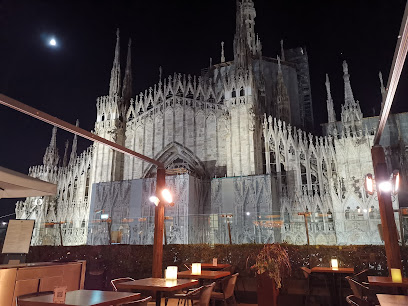
Il Bar in Piazza Duomo
Experience the elegance of Milan at Il Bar in Piazza Duomo, where exquisite dining meets breathtaking views of the city's iconic Cathedral.
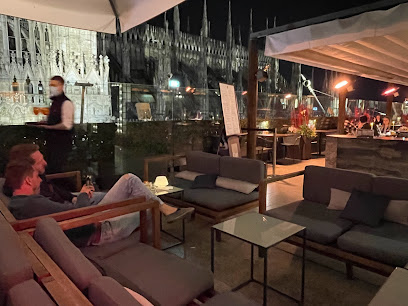
Bar Duomo
Experience the heart of Milan at Bar Duomo, where traditional Italian flavors meet a vibrant café atmosphere.
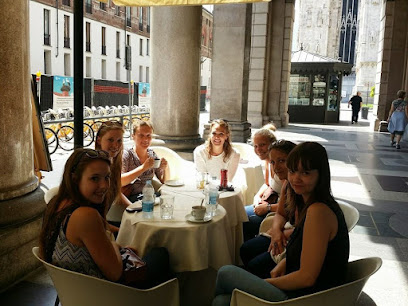
The VIEW by Makr Shakr Rooftop Milano
Explore Milan's skyline at The VIEW by Makr Shakr Rooftop, where exquisite cocktails meet breathtaking views of the iconic cityscape.
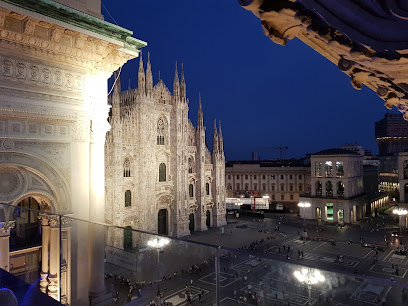
Martini Roof Club Milano
Experience the elegance of Milan at Martini Roof Club Milano, where stunning views meet exquisite cocktails in a vibrant atmosphere.
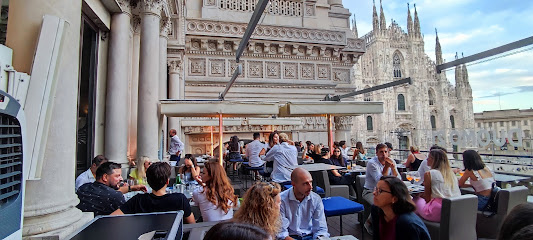
Local Phrases
-
- HelloCiao
[chow] - GoodbyeArrivederci
[ah-ree-veh-dehr-chee] - YesSì
[see] - NoNo
[noh] - Please/You're welcomePer favore/Prego
[pehr fah-voh-reh/preh-goh] - Thank youGrazie
[grah-tsyeh] - Excuse me/SorryScusi/Mi dispiace
[skoo-zee/mee dee-spee-ah-cheh] - How are you?Come stai?
[koh-meh stah-ee] - Fine. And you?Bene. E tu?
[beh-neh/eh too] - Do you speak English?Parli inglese?
[pahr-lee een-gleh-zeh] - I don't understandNon capisco
[nohn kah-pee-skoh]
- HelloCiao
-
- I'd like to see the menu, pleaseVorrei vedere il menù, per favore
[vohr-reh-ee veh-deh-reh eel meh-noo, pehr fah-voh-reh] - I don't eat meatNon mangio carne
[nohn mahn-joh kahr-neh] - Cheers!Salute!
[sah-loo-teh] - I would like to pay, pleaseVorrei pagare, per favore
[vohr-reh-ee pah-gah-reh, pehr fah-voh-reh]
- I'd like to see the menu, pleaseVorrei vedere il menù, per favore
-
- Help!Aiuto!
[ah-yoo-toh] - Go away!Vattene!
[vah-teh-neh] - Call the Police!Chiamate la polizia!
[kyah-mah-teh lah poh-lee-tsyah] - Call a doctor!Chiamate un dottore!
[kyah-mah-teh oon doh-toh-reh] - I'm lostMi sono perso
[mee soh-no pehr-soh] - I'm illSono malato/a
[soh-no mah-lah-toh/ah]
- Help!Aiuto!
-
- I'd like to buy...Vorrei comprare...
[vohr-reh-ee kohm-prah-reh] - I'm just lookingSto solo guardando
[stoh soh-loh gwar-dahn-doh] - How much is it?Quanto costa?
[kwahn-toh koh-stah] - That's too expensiveÈ troppo caro
[eh troh-poh kah-roh] - Can you lower the price?Puoi abbassare il prezzo?
[pwah-ee ahb-bahs-sah-reh eel preht-soh]
- I'd like to buy...Vorrei comprare...
-
- What time is it?Che ore sono?
[keh oh-reh soh-no] - It's one o'clockÈ l'una
[eh loo-nah] - Half past (10)Sono le dieci e mezza
[soh-no leh dyeh-chee eh meht-sah] - MorningMattina
[mah-tee-nah] - AfternoonPomeriggio
[poh-meh-ree-joh] - EveningSera
[seh-rah] - YesterdayIeri
[yeh-ree] - TodayOggi
[oh-jee] - TomorrowDomani
[doh-mah-nee] - 1Uno
[oo-no] - 2Due
[dweh] - 3Tre
[treh] - 4Quattro
[kwah-troh] - 5Cinque
[cheen-kweh] - 6Sei
[say] - 7Sette
[seht-teh] - 8Otto
[oht-toh] - 9Nove
[noh-veh] - 10Dieci
[dyeh-chee]
- What time is it?Che ore sono?
-
- Where's a/the...?Dov'è...?
[doh-veh] - What's the address?Qual è l'indirizzo?
[kwahl eh leen-dee-ree-tsoh] - Can you show me (on the map)?Puoi farmi vedere (sulla mappa)?
[pwah-ee fahr-mee veh-deh-reh (sool-lah mahp-pah)] - When's the next (bus)?Quando passa il prossimo (autobus)?
[kwahn-doh pahs-sah eel prohss-see-moh (ow-toh-boos)] - A ticket (to ....)Un biglietto (per ....)
[oon beel-lyeh-toh (pehr)]
- Where's a/the...?Dov'è...?
History of Duomo
-
The Milan Cathedral, known as the Duomo, was commissioned in 1386 by Gian Galeazzo Visconti, the Duke of Milan. It is a monumental example of Gothic architecture and took nearly six centuries to complete, with the final touches added in the 20th century. The Duomo stands on the site of an earlier church, Santa Maria Maggiore, which itself dates back to the 4th century, marking the area as a significant religious center for centuries.
-
The construction of the Duomo reflects the evolution of architectural styles in Milan. Initially designed in a Gothic style, the cathedral incorporates elements of Renaissance and Baroque architecture, exemplified by its intricate façade and stunning stained glass windows. The cathedral's spires, adorned with over 3,400 statues, showcase the artistic developments that occurred in Milan over the centuries.
-
During the early 19th century, under Napoleon Bonaparte's rule, the Duomo underwent significant changes. Napoleon ordered the completion of the façade, and the cathedral was consecrated as a symbol of his authority. The placement of the iconic golden statue of the Madonnina on the cathedral's spire in 1774 further solidified the Duomo's status as a symbol of Milanese pride.
-
The Duomo was heavily bombed during World War II, particularly in the air raids of 1943. Despite sustaining damage, restoration efforts began shortly after the war, and the cathedral was reopened to the public in 1956. This period highlighted the resilience of Milan and its commitment to preserving its cultural heritage.
-
Today, the Duomo is not only a religious site but also a cultural and social hub in Milan. It hosts various events, concerts, and art exhibitions, reflecting the city's vibrant culture. The surrounding Piazza del Duomo serves as a gathering place for locals and tourists alike, emphasizing the cathedral's role as a focal point in Milan's urban landscape.
Duomo Essentials
-
Duomo is centrally located in Milan and easily accessible from various neighborhoods. If you're coming from Milan Centrale railway station, take Metro Line 3 (Yellow Line) towards Comasina and alight at Duomo station. Alternatively, tram lines 1 and 3 connect to Duomo from different parts of the city. From Malpensa Airport, you can take the Malpensa Express train to Cadorna station and then transfer to Metro Line 1 (Red Line) to reach Duomo.
-
Duomo is well-served by public transport. The Duomo Metro station is a hub for both Line 1 (Red) and Line 3 (Yellow). Buses and trams also run frequently in the area. Biking is another great option, with bike-sharing services like BikeMi available. The area is pedestrian-friendly, making it easy to explore on foot.
-
Duomo is generally safe, but like any major tourist area, it has its risks. Pickpocketing can occur, especially in crowded spots like the Piazza del Duomo and shopping streets. Avoid dark alleys at night, particularly around the edges of the neighborhood. Exercise caution near the Galleria Vittorio Emanuele II, where crowds can attract opportunistic theft.
-
In case of emergency, dial 112 for police, ambulance, or fire services in Italy. For medical emergencies, the nearest hospital is Policlinico di Milano. Familiarize yourself with the location of the nearest pharmacy, which can be found throughout the Duomo area. It's advisable to have travel insurance that covers medical issues.
-
Fashion: Do dress respectfully, especially when visiting churches like the Duomo di Milano. Avoid shorts and sleeveless tops. Religion: Do be quiet and respectful in religious sites. Public Transport: Do validate your ticket before boarding and don't talk loudly. Greetings: Do greet with a friendly 'Buongiorno' (Good Morning) or 'Buonasera' (Good Evening). Eating & Drinking: Do try local pastries like panettone. Don't eat while walking, as it's generally frowned upon.
-
To experience Duomo like a local, visit early in the morning to avoid crowds. Try local cafés for a traditional Italian breakfast of cornetto and cappuccino. Explore the lesser-known streets around the Duomo, such as Via Torino, for unique shops and boutiques. Attend the evening aperitivo culture at local bars, where you can enjoy drinks accompanied by light snacks. Don't miss the rooftop terrace of the Duomo for breathtaking views of the city.
Nearby Cities to Duomo
-
Things To Do in Bergamo
-
Things To Do in Lugano
-
Things To Do in Locarno
-
Things To Do in Ascona
-
Things To Do in Parma
-
Things To Do in Genoa
-
Things To Do in St. Moritz
-
Things To Do in Turin
-
Things To Do in Zermatt
-
Things To Do in Verona
-
Things To Do in Cinque Terre
-
Things To Do in Arosa
-
Things To Do in Grindelwald
-
Things To Do in Davos
-
Things To Do in Murren











